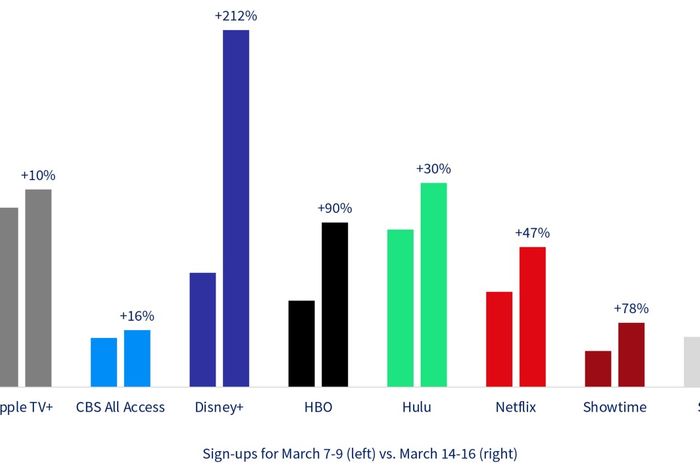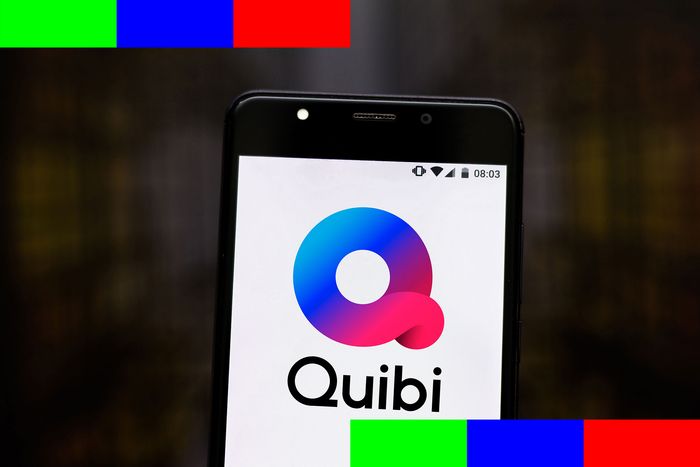
The COVID-19 pandemic isn’t anywhere close to being over; hardly anything feels close to normal right now. But things not related to the crisis are still happening, especially in the business world. AT&T’s WarnerMedia announced this week that Hulu vet Jason Kilar will succeed John Stankey as CEO next month, putting a streaming veteran in charge of one of the world’s entertainment giants. The Information’s Jessica Toonkel reported Kilar was a finalist for the gig a few weeks ago, but it was still somewhat shocking that the buttoned-up AT&T actually went through with such a bold choice. This week’s Buffering examines how Kilar was years ahead of the curve when it comes to streaming and why having a revolutionary at the top matters. We also check in with Jeffrey Katzenberg about next week’s big Quibi launch and why it’s still going forward despite [waves arms around wildly], and we’ll take a look at a couple other platforms expanding during the pandemic. Stay safe and healthy, everyone.
WarnerMedia’s New Boss
Back in the 1980s, CNN and TBS founder Ted Turner’s foresight in realizing that the future of television was wired (and subscription-based) earned him a reputation as the exec who was “cable before cable was cool.” He saw where the medium was headed, jumped in feet first and became a billionaire as Turner Entertainment grew into one of the dominant players at the dawn of the cable revolution.
Jason Kilar (probably) isn’t as rich as Turner at his peak; he’s certainly nowhere near as famous. But the man AT&T tapped yesterday to serve as CEO of its WarnerMedia unit is cut from the same revolutionary cloth as Turner. That’s a very good thing for the future of WarnerMedia in general, and its soon-to-launch HBO Max platform specifically.
While Kilar didn’t create the idea of Hulu — it was the product of a joint partnership between a slew of old and new media giants such as News Corp, NBCUniversal, and Disney — he was its very first CEO, guiding the service from before its 2008 launch until his departure in 2013. Hulu has arguably had far more success since Kilar left, but the relative success or failure of Hulu isn’t what makes Kilar such a great choice for WarnerMedia CEO. Rather it’s that Kilar was years ahead of the curve in realizing where the TV business was going — that the future was streaming. And in 2011, he was even brave (or stupid) enough to call out his old media bosses by (correctly) forecasting the collapse of the linear TV model and pointing out just what was wrong with old-school television. He did so via a post on the Hulu blog (long since taken down, though it lives on here). His key insights:
• “Traditional TV has too many ads,” Kilar wrote. “Users have demonstrated that they will go to great lengths to avoid the advertising load that traditional TV places upon them. Setting aside sports and other live event programming, consumers are increasingly moving to on-demand viewing.” (Remember, the companies that owned Hulu at the time were all heavily invested in the ad-supported ecosystem.)
• “Consumers want TV to be more convenient for them,” he added. “Consumption of original TV episodes will eventually mirror theatrical movie attendance: big opening Friday nights, but more consumption will be in the days and weeks afterward.”
• And anticipating cord-cutting long before it was on most folks’ radar, Kilar rightly predicted that “if enough customers refuse to purchase their bundles, then the bundles will either be reduced in price/scope (possible) or dismantled (far less likely).”
Rich Greenfield of LightShed partners sent out a note a few hours after news of Kilar’s hiring broke, remembering the Kilar memo and recalling how at the time Hollywood reacted in horror to his truth-telling. A THR analysis from the time quoted an industry source gobsmacked by what was seen as the exec’s recklessness. “I think he was stupid — it’s obviously really stupid,” the insider told THR. “But he was so engaged in the process of describing the new world order that he basically rambled on and forgot that these businesses you’re pissing all over are not going to be happy.” Despite speculation that Kilar would get sacked for his words, he survived two more years.
But while he didn’t get the ax, Kilar also didn’t fully succeed at Hulu. His corporate bosses never gave him the power to make the changes that would have let Hulu keep up with or even bury Netflix at a time when Netflix was still a relative blip on the streaming scene. (Kilar literally left the month before House of Cards premiered, almost as if he knew what was coming.) THR reported in 2011 that Kilar had been trying to get his bosses to drop Hulu’s starting rate in half, to $4.99, in order to counter the rising threat of Netflix. They balked, and in the process Netflix quickly leapfrogged past Hulu in terms of subscribers and industry influence. (Hulu, of course, now costs dramatically less than Netflix, with current management Disney realizing that the boost in subscriber tally is worth much more than a few extra dollars in subscriber fees.)
What he brings to the table: Kilar hasn’t been a big player in the streaming wars since he exited Hulu. He started a short-form streaming service called Vessel (shades of Quibi) in 2015; in 2016, it was bought by Verizon and shut down. But the knowledge he gained launching Hulu, combined with his previous career moving Amazon into the business of selling DVDs online, is clearly why AT&T execs believe he’s the right person to move WarnerMedia more fully into the streaming era via HBO Max. The platform’s current bosses — traditional TV vets Robert Greenblatt and Kevin Reilly — have a wealth of experience in programming and traditional distribution. What Kilar brings to the mix is the entrepreneurial spirit so often lacking at big companies, as well as a deep understanding of how streaming works and why it is different from traditional TV.
Of course, WarnerMedia’s new CEO will be responsible for a much, much bigger entity than he has ever run, as he’s now overseeing the Warner Bros. film and TV studios, CNN, and the company’s collection of cable channels in addition to HBO Max (and HBO). Kilar doesn’t have the deep understanding of and relationships with the creative community that a Bob Iger or Jeff Bewkes had. But at least one of his new rivals thinks he’s up to the task: “Scary for us to have you there, but great for the world that HBO will be strong,” Netflix founder Reed Hastings tweeted to Kilar after the news of his hiring was announced.
Still crazy after all these years? It will also be interesting to see whether AT&T, a pretty conservative company historically, will give 2020 Jason Kilar the leeway to be as brash as 2011 Jason Kilar. The closing paragraph of his “future of TV” memo has serious Steve Jobs overtones (in a good way), and I think is worth quoting in full:
Our journey at Hulu involves significant risk. That is the nature of innovation, particularly the business of re-inventing television. A number of you that are reading this might be thinking that we’d have to be crazy to think that our small team can actually re-invent television and compete effectively against a landscape of distribution giants like cable companies, satellite companies, and huge online companies. We are crazy. All entrepreneurs need to be. If it was easy, everyone would be doing it and there would be no naysayers. We are nothing if not a team that believes in the value of convictions, thoughtful stubbornness, and the relentless pursuit of better ways.
Everyone’s Watching Everything
The least surprising thing about the Great Lockdown is that people have started consuming more video content in recent weeks. Broadcast ratings have surged, particularly for news programming. And Nielsen this week reported that during the week of March 16 (which feels like eons ago), Americans watched more than 156 billion minutes of streaming content, double the same week in 2019 and up sharply from the last week of February (115 billion).
But audiences aren’t just streaming more. There’s also evidence that many more consumers are signing up for subscription services, according to data from Antenna, a new streaming-analytics company run by former Mic exec Rameez Tase and longtime Nielsen staffer Jonathan Carson. Last week, they issued a report saying Disney+ saw sign-ups leap a stunning 212 percent week to week. (A broader measure of eight major streamers showed a gain of 64 percent.) While Antenna’s data is an educated guess, Tase and Carson are respected in the industry, and their work recently showed up in an essay about the impact of COVID-19 by analyst Matthew Ball. (You can read Ball’s thoughts here.)
It’s logical Disney+ would be leading the pack in terms of new sign-ups right now. Not only is it one of the younger platforms out there, which means it has more growth potential, but its family-friendly lineup is genetically engineered for a time when kids and parents are cooped up together 24/7. And Disney made a smart move by deciding to move up the SVOD premieres of Frozen 2 and Onward by a few months because of the crisis. Nielsen’s report also speculated that Disney+ is seeing big gains in usage: Though the company doesn’t yet break out the service the way it does for Netflix and Amazon, its “other” category — which includes Disney+ and Apple TV+ — has seen big upticks in recent weeks. (This is purely anecdotal, but I’ve noticed a lot more Disney+ advertising on traditional TV of late, with new spots leaning in on the idea of watching it together.)
One more thought: Given how well Disney+ seems to be doing, there may be no need for any further stunts like the early Frozen 2 release. But I do wonder whether the company might try to lock in these new subscribers by bringing back a three-year discount offer like the one it offered before launch, or perhaps try to boost sister streamer Hulu with a bundle offer more attractive than the current grouping of Disney+, Hulu, and ESPN+ (the latter of which is not of much value right now, given the scarcity of sports).
Quibi’s Big Week Ahead
It’s been in development for nearly two years, and on Monday, Quibi will finally arrive. The well-funded streaming start-up from Hollywood icon Jeffrey Katzenberg and veteran business titan Meg Whitman is different from most of the other players in the subscription-video space because of its focus: short-form scripted and unscripted content served up in bite-size morsels under ten minutes, all designed to be watched on phones. (If you’ve somehow escaped all the hype around Quibi the past few months, (1) good for you, and (2) here’s the FAQ about the platform that I wrote for Vulture last summer.)
The launch plan: Quibi is going forward despite the fact that, well, you know … the world is basically in chaos right now as a result of COVID-19 and the subsequent societywide lockdown (and pending economic recession). With sports suspended and movie theaters shut down, Katzenberg says he and Whitman had had talks about whether Quibi should postpone its debut, too. “It was probably about three weeks ago … we started brainstorming on the challenges and difficulties of staying the course, and also what the opportunity would be,” he told me.
But after they quickly “weighed up the pluses and minuses,” the execs decided that a delay didn’t make sense. The streamer’s massive marketing campaign, which included Super Bowl advertising, had been under way for months. Quibi had been stockpiling shows for some time now, so the recent shutdown of Hollywood production wasn’t an issue. And almost all of the service’s news and information shows — what Quibi calls its “Daily Essentials” — were able to switch to remote production, allowing them to go forward despite the obstacles presented by social distancing and stay-at-home orders.
In this economy? Katzenberg and Whitman acknowledge the need to adjust their launch plan in response to the crisis. They know their marketing messaging right at launch could have a tougher time breaking through since audiences would be distracted by virus coverage. And with millions now unemployed, and millions more facing lost wages, asking consumers to spend $5 per month on an untested new service not tied to an existing entertainment brand is … a tough ask. “To ignore changed circumstances and not to pivot from that I think would be imprudent,” Katzenberg says. “So a couple of weeks ago, we pivoted from a two-week free trial to a 90-day free trial for everybody that signs up between [now] and April 19.” That’s a huge change: While some streamers have shifted to 30-day trials post-coronavirus, few subscription video services have offered such a long trial to all consumers.
Quibi stands to lose millions in potential subscription revenue by giving wide access to the service for free for so long. But the upside is, the extended window gives it more time for audiences to get invested in the platform and understand how it works, in theory forming a Quibi habit. And while Quibi was designed to fill those “in-between moments” in people’s days that no longer exist — like commuting or waiting for a movie to start — Katzenberg thinks audiences will see it as a much-needed break from #QuarantineLife.
“I feel confident that when people actually get a chance to see what the best storytellers in the world have done for us, the content that they’ve made, I think it’s going to be a great escape,” he says. “I think it’s going to bring some happiness, laughter, and fun to people in a new way — a good distraction in a moment in time in which we all could use some distraction.”
I’ll have more from my conversation with Katzenberg next week on Vulture and in the next edition of Buffering.
Two More Players Enter the Scene
Quibi isn’t the only new platform launching during a pandemic:
• This week saw the debut of RetroCrush, a new ad-supported, free streaming service focused on old-school anime titles. Operated by film/TV distributor Digital Media Rights, the network has shows with amazing titles such as Devil Lady, Creamy Mami, and Pastel Yumi, the Magical Idol. I know nothing about anime, but I’m suddenly intrigued.
• As I reported earlier this week at Vulture, AMC Network–owned BBC America is expanding its nature-centric micro-network Wonderstruck. Cable customers will now be able to watch 24 hours of cuddly creatures on Saturday and, during the length of the crisis, on Thursdays as well. There’s also a new mobile-optimized website with cute critter clips available even to those without a cable log-in.
Parting Shot
“We’re Americans. There’s nothing we do better than not doing things.”
—Stephen Colbert during Monday’s CBS Late Show monologue.



